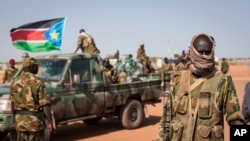The United Nations Mission in South Sudan (UNMISS) has released new details of the killing of hundreds of people in two separate incidents in April. U.N. investigators determined civilians were deliberately targeted by ethnicity in the towns of Bentiu and Bor in some of the worst violence since the South Sudan conflict began over a year ago.
A new report from the U.N. mission determined at least 353 civilians were killed in the two attacks blamed separately on rebel opposition forces and mobs loyal to the government.
In the first incident, investigators say hundreds of civilians were killed when rebel soldiers overran the town of Bentiu in Unity State.
The report says soldiers shot and killed civilians hiding in a mosque to escape the fighting. Investigators said some shooters may have pointed their guns through the windows of the building to hit those huddled inside.
Two days later, in apparent retaliation for the Bentiu attack, a mob armed mostly with sticks, machetes and iron bars stormed a U.N. base in the town of Bor, in Jonglei State, killing at least 47 displaced people who had taken refuge there.
UNMISS spokesman Joe Contreras said assailants in both incidents deliberately targeted their victims along the same ethnic lines that have defined the conflict.
“Victims were deliberately targeted on the basis of their ethnicity, nationality or perceived support for one of the parties in the conflict and nearly nine months after the attacks took place, no perpetrator has yet to be held accountable,” Contreras said.
The attack in Bentiu was perpetrated by members of the opposition movement loyal to former Vice President Riek Machar, an ethnic Nuer, who organized rebel forces after a fallout with President Salva Kiir - a Dinka.
The report says most of the victims in Bentiu were from the Darfur region of neighboring Sudan, and were seen to be loyal to Mr. Kiir's government.
At the U.N. base in Bor, mostly Dinka mobs attacked Nuer civilians, singling them out by their tribal facial scars -- six distinct lines that stretch from ear to ear.
The incidents represent two of the bloodiest events in the ongoing conflict which has claimed thousands of lives and displaced more than one million people.
While Bor is mostly calm these days, Bentiu is still experiencing bouts of violence. This week, government and rebel forces blamed each other for fighting near the state's oil fields.
The U.N. base in Bentiu currently hosts more than 40,000 civilians who have fled violence, and Contreras says displaced people continue to come.
“The security situation, at least in (displaced people's) judgment is sufficiently precarious as to warrant them staying on our premises and also continues to drive people in our direction,” Contreras said.
Both sides in the conflict have repeatedly denied responsibility for attacks on civilians.
Negotiators continue to maintain their commitment to ongoing peace talks in Ethiopia, though numerous cease-fire deals signed since last January have all fallen through.









